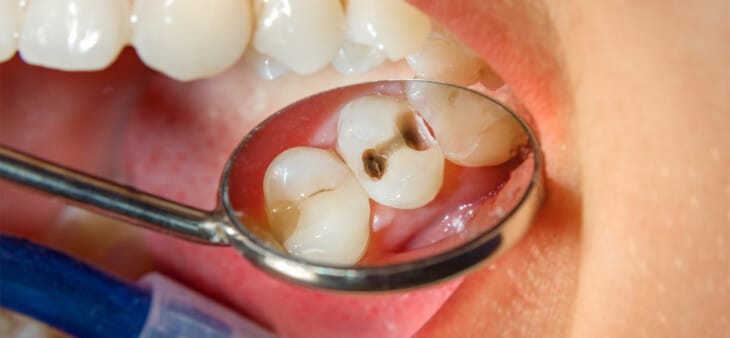
Tooth health is a topic many of us often overlook until we experience that unexpected twinge of pain. Despite advancements in dental care, untreated tooth decay remains a significant concern, affecting around 26% of adults aged 20-64.
Learn how and why cavities form so you can better understand and care for your teeth.
The Process of Tooth Decay
Tooth decay begins when the hard outer layer of your teeth, known as enamel, is attacked by acids produced by bacteria in your mouth. These acids gradually erode the enamel, leading to the formation of cavities or holes in the teeth.
- Plaque formation: The process starts with plaque formation, a sticky biofilm of bacteria that constantly develops on your teeth. When you consume food and beverages containing starches and sugar, the bacteria in plaque create acidic byproducts that attack tooth enamel.
- Enamel erosion: The acid leads to the loss of minerals like calcium, phosphate, and fluoride in the enamel, a process known as demineralization. This results in the enamel becoming weak and eventually forming tiny holes. With continuous acid attacks, these holes grow larger and penetrate deeper layers of the tooth.
- Cavity formation: Once the acid reaches the dentin, the second layer of the tooth, the decay process accelerates since dentin is softer than enamel. If left untreated, the decay can reach the innermost layer, the pulp, causing intense pain and sensitivity.
Factors Contributing to Tooth Decay
Tooth decay isn’t just the result of occasional lapses in brushing. It’s caused by various factors, including diet, oral care routines, genetics, and environmental influences.
- Poor oral hygiene: Neglecting regular brushing and flossing allows plaque to accumulate and harden into tartar, providing a breeding ground for bacteria.
- Diet: Consuming foods and drinks high in sugars and starches frequently can increase the risk of tooth decay as they provide more fuel for bacteria to produce acids.
- Dry mouth: Saliva washes away bacteria, neutralizes acid, and contains minerals crucial for remineralization and cavity prevention. Due to reduced saliva flow, individuals with dry mouth or low saliva production are more susceptible to tooth decay.
- Lack of fluoride: Fluoride helps strengthen enamel and prevent decay. Lack of fluoride in drinking water or not using fluoride toothpaste can increase the risk of cavities.
Preventing Tooth Decay
Preventing tooth decay involves a combination of lifestyle changes and professional dental care, including:
- Maintain good oral hygiene: Brush your teeth at least twice daily using fluoride toothpaste. Ensure you brush for at least two minutes, reaching all surfaces of your teeth. Floss daily to remove food particles and plaque from between your teeth and under the gumline, where toothbrush bristles can’t easily reach.
- Rinse with a mouthwash: Use an antimicrobial or fluoride mouthwash to help reduce plaque and bacteria.
- Regular dental check-ups: Visit your dentist at least twice yearly for professional cleanings and routine check-ups. They can detect and address early signs of tooth decay before they become severe.
- Limit sugary foods and drinks: Bacteria in the mouth feed on sugars, producing acids that can erode tooth enamel. Eat a diet rich in fruits, vegetables, lean proteins, and whole grains, but avoid frequent snacking. Constant snacking provides more opportunities for bacteria to produce acid, increasing the risk of enamel erosion.
- Use fluoride: Ensure your toothpaste contains fluoride. Depending on your region, tap water might also be fluoridated. Your dentist might recommend additional fluoride treatments or products for those at high risk.
- Chew sugarless gum: Chewing stimulates saliva production, which neutralizes acids, provides enzymes to counteract bacteria, and remineralizes enamel.
- Apply sealants: These protective coatings are applied to the chewing surfaces of molars. Sealants block food particles and acids, especially in the deep grooves and fissures of back teeth. They are especially beneficial for children who may struggle to clean their teeth properly.
- Drink water: Regularly drinking water, especially after meals, helps rinse away food particles and bacteria. If you consume acidic beverages like soda or fruit juices, drink water immediately afterward to neutralize the acids.
Take Action for Healthy Teeth Today
Understanding tooth decay is key to stopping it early and keeping your teeth healthy.
Need help or advice on tooth decay? Call Aurora Dental Group at (630) 896-7354. Our friendly team can answer your questions and help you keep your smile bright and healthy. Schedule your appointment today!
